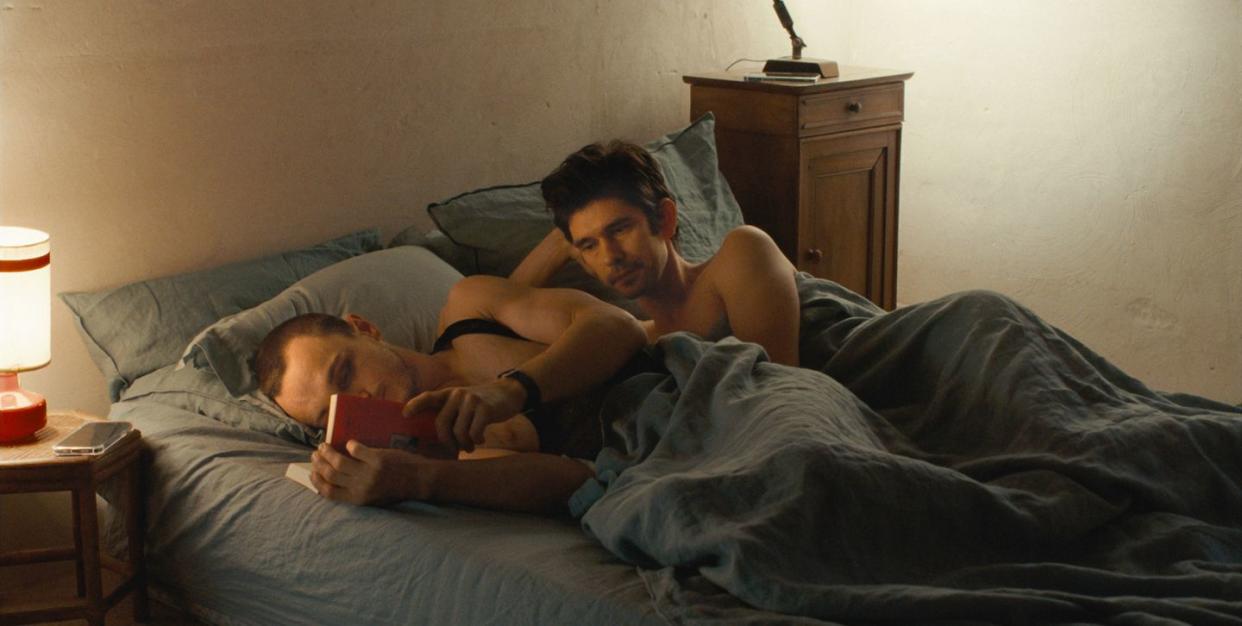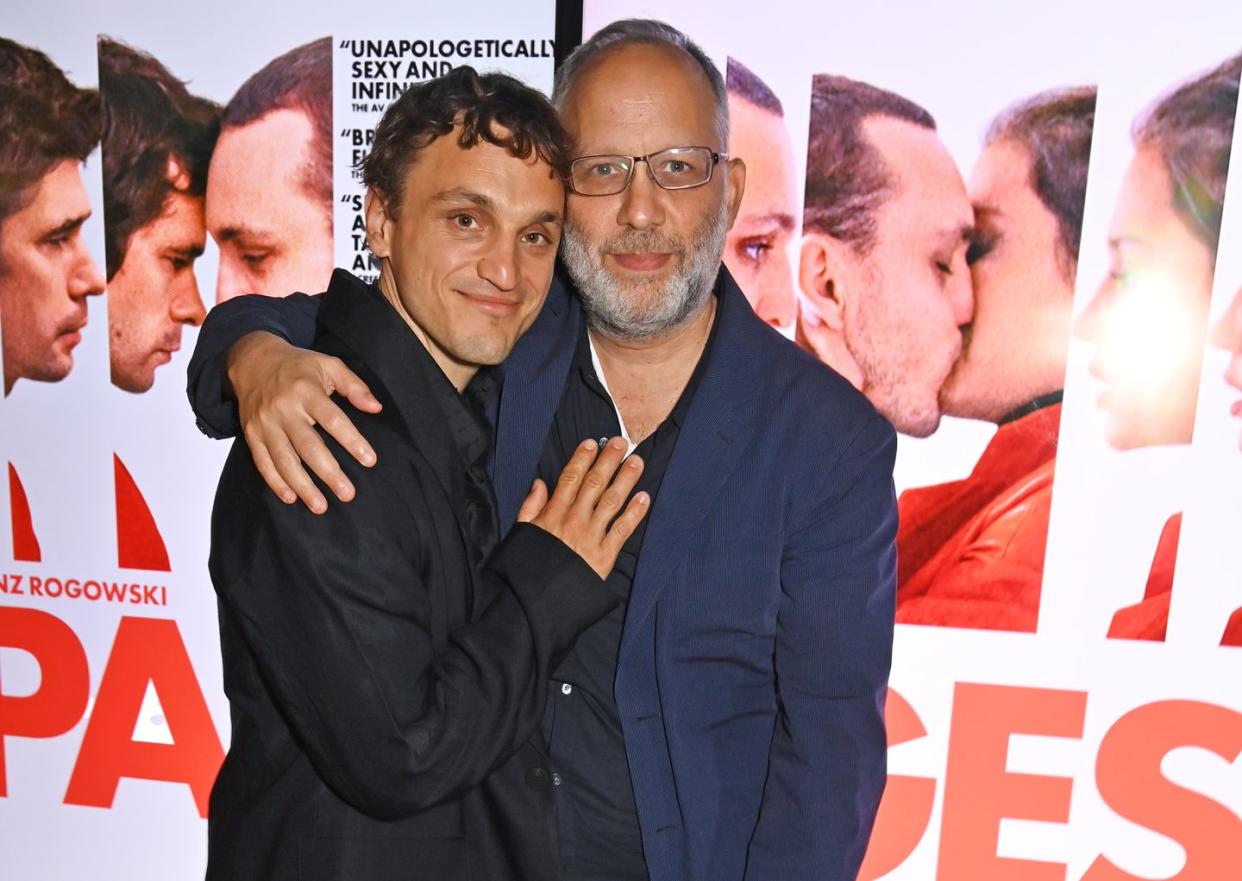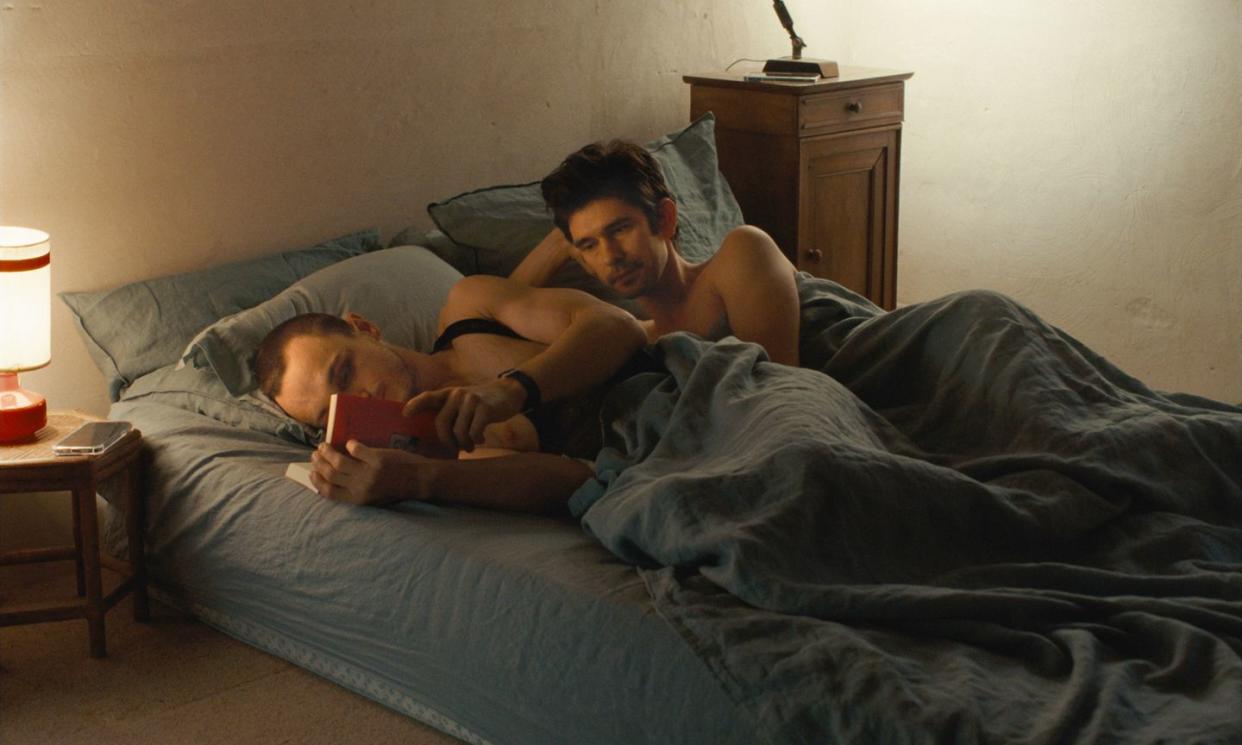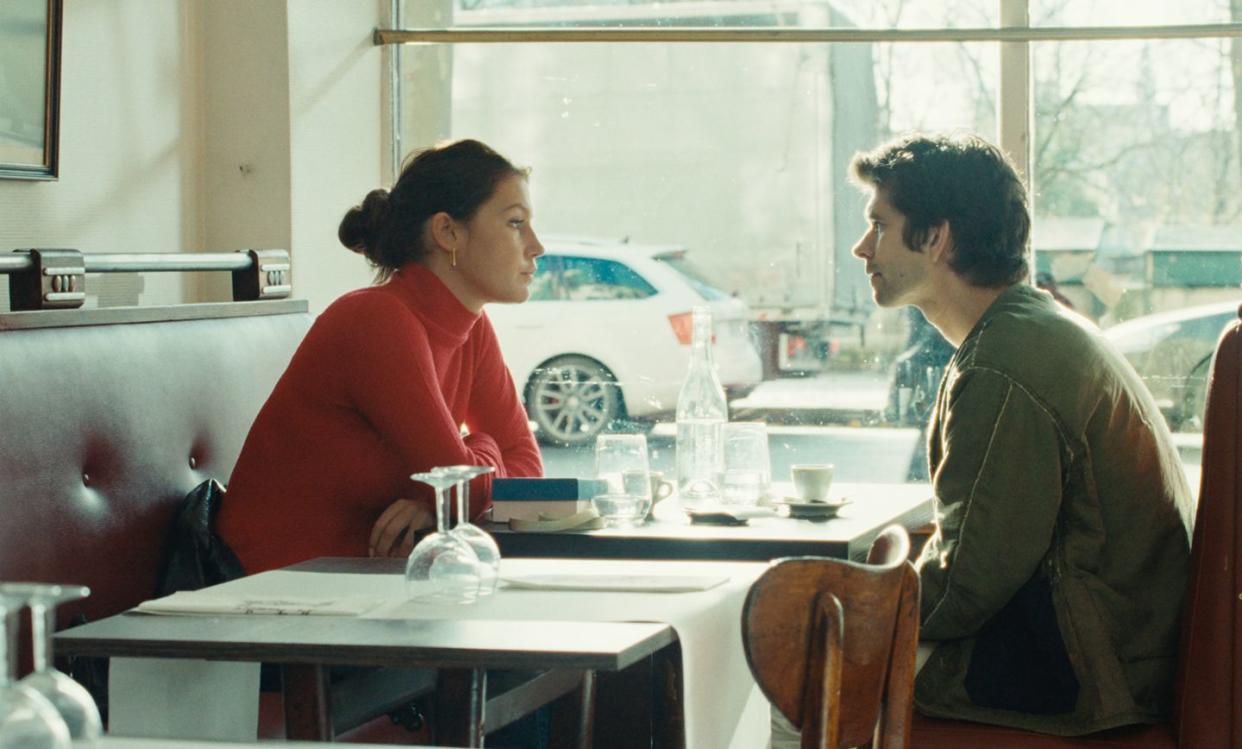Ira Sachs and Franz Rogowski talk sex and the contradictions of Passages

Rainbow Crew is an ongoing interview series that celebrates the best LGBTQ+ representation on screen. Each instalment showcases talent working on both sides of the camera, including queer creatives and allies to the community.
Next up, we're speaking to director Ira Sachs and actor Franz Rogowski about their Sundance hit, Passages.
Passages is sexual and alluring yet it can also be awkward and painful and even hateful to watch at points. What it's not is a love story according to director Ira Sachs, even though it's defined as such on sites like Wikipedia and Rotten Tomatoes which describe Passages as a "romance" or "French romantic drama".
He's right though, of course. None of these descriptors really do the film justice. For starters, it's not even French, necessarily.
Sure, the love triangle plays out in Paris, and Adèle Exarchopoulos is mesmerising as one-third of said triangle, but the two gay men who become entangled in her life are played by the UK's Ben Whishaw AKA Paddington, and Franz Rogowski, Germany's festival darling. Plus Ira himself is American, so he comes into this world with an outsider's lens.
That fluidity can be felt in all aspects of Passages, from the sexual identity of this horny trio to the shifting relationships at hand and even the way it's edited to drop us in and pull us back out of scenes at unexpected points. Passages are defined as the space between entrances and exits, yet the film itself operates in that liminal world, taking delight at the contradictions that are created in this tension.
Digital Spy caught up with Ira Sachs and Franz Rogowski to discuss how Passages breaks form in ways that defy expectation and how intimacy plays a vital role in that.
We've read interviews where you've said Passages isn't exactly a traditional love story, and heard you describe it as an action film with elements of horror in certain places too. How does the film defy labels, and why is fluidity so integral to its tone and message?
Ira Sachs: The film defies labels because it was written from the viewpoint of the actor and the character. There wasn't a set idea of what might happen.
In every moment, I was trying to give space for contradictions, and contradictions in a way are anti-genre. It then becomes a film about human texture and the ways that people are from moment to moment, which could seem like it's about nothing, but I wouldn't say that's the case.
Because of the freedom in which we tried to approach the cinema, it's a film that is really about that freedom more than it is about any one kind of story.
Franz Rogowski: Something that is truly fluid is not understandable to the human brain because it's permanently changing, constantly changing its shape. So what we do in order to understand the world is we create those labels that you were referring to and we give those names to the world.
In film, one of the most powerful tools is the edit, the way you cut things and create a relationship between one fluidity and another. By rearranging those and by giving a start and an end to them, you also create an access to to the world of fluidity by destroying it. Something has changed.

It's interesting to us to create stereotypes, but also break them and also in the layers of cinematography to create something fluid yet at the same time also be aware that we need to create shape in order to make it accessible.
The words in this film contain such a visceral power, like at the end when one character says, "You look ugly now," to another. If this is an "action film" as you've said before, then words are the weapons these characters wield. But coming back to this idea of contradictions, the silences are full of power in Passages too. So many important moments move the story forward without anything being said at all.
IS: For me, it's an issue of creative economy, aesthetic economy. You don't want there to be too much. There shouldn't be things that are superfluous.
I don't rehearse with the actors before we start shooting, so they have to learn their lines on their own. There is sort of space for what I consider emotional improvisation, but I actually try to keep them pretty close to the words that are on the page and part of that reason is again this idea of economy.
I think that connects to costume for example. So instead of having seven colours, why not have one? What is the impact of something that is singular? Aesthetically, and for the impression of the film?
I was just thinking about what you were talking about before though, how you were sort of theorising about the film, and what I realised is that's the opposite of what we did on set. In a way, this connects to the dialogue too. I was basically, like, learn your lines, show up, act, move, go. There was something very simple about what was happening, which created room for something more complex.
FR: Most of the things we did have been a kind of dualistic companionship. If there's an entrance to something, there is an exit to something. If there's light, there's darkness. If there's something explicit, there might be something else under the surface.
What I love about Ira's movies is this utopian space of democracy where these things can coexist. Whereas in real life, often they can't. There's a hierarchy. But for 90 minutes, they can coexist on screen. They can align on the silence and a breath or a texture and a costume. They can start talking to one another and not just be trapped in this pyramid of purpose
There's a key sex scene in the middle of the film that everyone's been talking about. Ben [Whishaw] has mentioned before that this sequence was one of the shortest in the whole script, just a few words with very little detail. Would you mind talking about how you approached that scene on the day and how you constructed it together on set?
FR: Well, we all knew this day would come. I don't know if we intentionally avoided talking about it, but we knew this day would come, and we were excited about it, but at the same time, as is often the case when you have sex with a stranger, you are also a bit nervous.
So we met on this day. We started rehearsing choreography that would allow us to get to it without showing too much. But then, once in bed, I think all we wanted to create was intimacy. We didn't really know how it would work, but we knew that we could trust each other. We knew that we could just explore things and then see what happened. And that's what we did.

We were a bit shy. We did our choreography. We ended up in bed, and then once we started having sex, it started to be alive and we started to feel it, you know? Your breath changes, you start sweating. Probably Ira even started sweating behind the camera. We had a good time.
What you want to create is this mixture of tension and relaxation and intimacy. Something that people can trust, but you also need to embrace the unknown and need to surrender to a certain amount of risk. I think that's what we did.
When I look at those sex scenes, I don't really see the actors being intimate. I see this triangle and the two sculptures of relationships that are formed.
On the one hand, you see a man and a woman, two individuals approaching the other, the unknown, trying to connect, trying to penetrate or being overwhelmed by the penetration. On the other hand, you see a sculpture of a couple. It's two men having sex together. Yes, one is penetrating the other but they've become one to certain extent.
And also the long shot on Ben's back. It's not just Ben having a beautiful back, and he does. He really knows how to use his pelvis and his dick. But it's also the landscape of a relationship. It's very introspective. So I guess, on set, it felt very real like we are having a sex scene, but looking at it in a movie, it feels like it's about much more than that.
It's kind of frustrating how literal this whole discussion became about this being explicit sex and then this NC-17 rating. Really? It's not an explicit sex scene that is not necessary, or putting teenagers at risk. It's ridiculous.
IS: I love hearing Franz talk about it because these are also kind of private moments. There's the tension of trying to have something happen in front of the camera, which you can't create without other people.
That's basically every day of shooting to some extent. They have to give you something, but I think because there's no dialogue, you're not sure if they're going to have enough to give you what you need or what you might don't even know you need. It's very interesting for me to hear him describe it in this kind of analytic way.
I also would say that when he described intimacy and the forms coming together, what I think about actually is that the same could be said about another scene, which is purely improvisational. What I'm seeing is an incredibly high, fine, improvisational narrative being created by these two performers, because there's a story being told and their sentences being written. There's exclamations and there's pauses, and there's a lot of dialogue that's happening, but not with words.
So for me, what I'm experiencing is the pleasure of good performance and also with what you're describing, that's also what happens with sex. It's also the pleasure of good performance. So the improvisational nature of sex is similar to the improvisational nature of acting.
A lot of people have been asking you about that sex scene in particular, so we wanted to finish by giving you some space to discuss another scene of your choosing, one that really resonates when you look back at this film.
FR: For me, one of my favourite moments is when Tomas moves in with Agathe and he goes on her balcony. He's wearing a leather jacket and you can already tell, okay, this is not going well [Laughs]. That jacket is way too ambitious for someone who's just moved in.
Then he calls Martin, you have an edit, and then you see Martin on the other side wearing almost nothing — just a red robe. In combination, there's classical music and a Black guy. It creates so many textures and cultural references within four seconds.

It's so powerful to me, the poetry of this triangle and the absurdity of their different realities. I keep thinking about that moment. And yeah, some of those pieces are in my wardrobe now [Laughs].
IS: I do feel a lot of different pleasures from different things that we created together. But the scene that came to my mind now was when Tomas has been broken up with and he then goes back into his bedroom. He's in his tuxedo, and he's trying to figure out what the hell to do.
To me, everything about that shot, which is a single shot, kind of really comes together. There's incredible energy there, including how the camera works with space. It's very strong in that moment. What came to my mind is the tension that I feel in that shot is not dissimilar to what first attracted me to Franz, which was this karaoke performance of Sia's 'Chandelier' in Michael Haneke's Happy End.
With his body and his brain, because I think it's both, like they're super connected, Franz is able to convey so much feeling, emotion distinction and a kind of fineness of expression. It's like a form of aesthetic expression. And I feel that in that one shot in a way that sort of conveys what's beautiful about this guy.
Passages is out now in UK cinemas.
You Might Also Like
